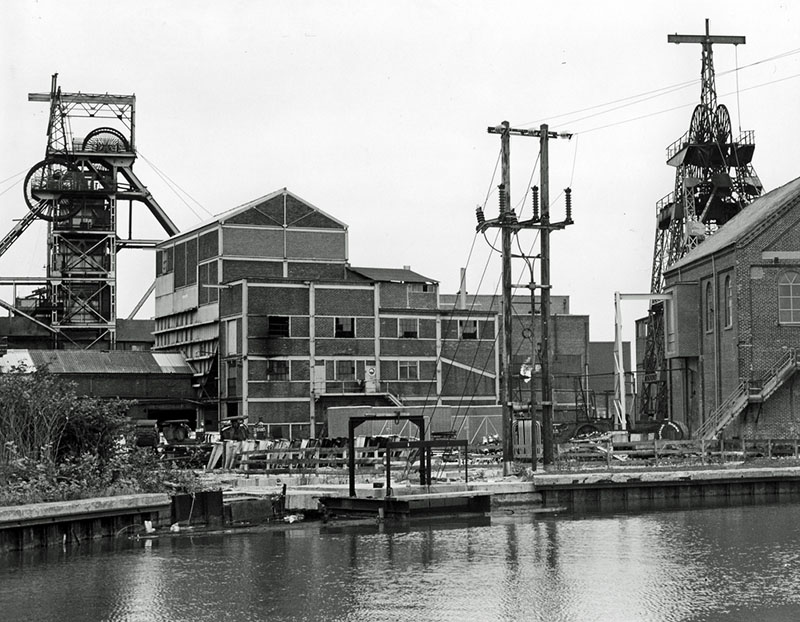Coal and Community
Bickershaw Colliery was located off Plank Lane, Leigh, in the Lancashire coalfield. The first shaft was sunk around 1830 and by 1877 it was a substantial source of coal extraction. In 1881 Bickershaw miners were involved in a three-week strike across the coalfield when they threatened to wreck the colliery to enforce support for their cause. Bickershaw miners also took part in the dramatic national disputes of 1893, 1912, 1921 and 1926. In 1932 there was a serious incident when the cage crashed to the bottom of one of the shafts resulting in the death of twenty workers. A year later, the colliery underwent a process of modernisation and mechanisation. This led to the exploitation of further seams in Leigh and Wigan.

Bickershaw Colliery 1980s (Photograph by John Harwood)
With the advent of public ownership in 1947 Bickershaw was one of 86 collieries in Lancashire that were taken under state control. The workings were further developed and the colliery now employed 2,455. By 1967 the colliery had four shafts and in 1973 it was attracted over 4 million pounds of investment in order link its underground workings with the neighbouring collieries of Golborne and Parsonage.
In 1972 the fields surrounding the colliery hosted the Bickershaw Festival with performances by The Kinks, the Grateful Dead and Captain Beefheart. The singer and pianist Georgie Fame was also a native of the locality hailing from nearby Cotton Street. The colliery was also featured in the ITV drama series Sam (1973) and the BBC play Early to Bed by Alan Bleasdale broadcast in 1975.
In 1977 Bickershaw celebrated its centenary with a week of special events and an open day for visitors. By now it was designated with ‘super-pit’ status by the National Coal Board. The three collieries that formed the Bickershaw Complex were now fully-joined underground with the coal being extracted through conveyor system that reached the surface at Plank Lane.

Children playing football outside Bickershaw colliery
The majority of Bickershaw miners were organised in the Plank Lane Branch of the North Western Area of the National Union of Mineworkers. In the 1984/5 strike the branch mandated miners not to cross picket lines, but a significant minority returned to work in the later stages, symbolised by around 70 members from Hindley near Wigan who went back in late-May. On 12 June there was some conflict during a mass picket dubbed ‘the Battle of Bickershaw’.
By January 1985 only a minority of miners remained on strike. Two years after the dispute the colliery was operating at a profit and breaking production records through extracting coal from four faces. Miners remained a significant presence in the town of Leigh; with a large club, a band, various sports teams, an annual gala and a sponsored Member of Parliament. In 1991 the colliery was subject to some geological problems and profitability warnings from British Coal. The end of production was formally announced in early 1992 with the union officials declaring that it had been ‘a political closure’. The site has recently been developed with the construction of a new housing estate and a marina.
This profile was written towards the beginning of our project, further material about Bickershaw colliery is available at our exhibtion website.


/prod01/wlvacuk/media/departments/digital-content-and-communications/images-18-19/iStock-163641275.jpg)
/prod01/wlvacuk/media/departments/digital-content-and-communications/images-2024/250630-SciFest-1-group-photo-resized-800x450.png)
/prod01/wlvacuk/media/departments/digital-content-and-communications/images-18-19/210818-Iza-and-Mattia-Resized.jpg)
/prod01/wlvacuk/media/departments/digital-content-and-communications/images/Maria-Serria-(teaser-image).jpg)
/prod01/wlvacuk/media/departments/digital-content-and-communications/images-2024/241014-Cyber4ME-Project-Resized.jpg)
/prod01/wlvacuk/media/departments/digital-content-and-communications/images-18-19/210705-bric_LAND_ATTIC_v2_resized.jpg)